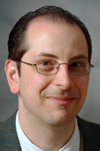Addressing cancer globally 'next great frontier'

When you examine MD Anderson’s family tree, you may discover relationships that you never knew existed.
Sister institutions. Partnerships. Affiliations. Extensions. You name it, MD Anderson has them.

Oliver Bogler, Ph.D.
Feeding off the deep roots and sturdy trunk of the main campus in Houston, these branches stretch across the United States and far beyond.
“Our mission to eliminate cancer extends around the world,” reminds Oliver Bogler, Ph.D., vice president for Global Academic Programs. Bogler works closely with other leaders in MD Anderson’s Center for Global Oncology who concentrate on clinical programs and business development. His aim is to build the world’s premier scholarly network dedicated to:
- preventing and treating cancer,
- conducting basic, clinical and translational research, and
- educating future generations of scientists and health care professionals focused on eliminating cancer.
From Texas to New Mexico, Arizona and Florida; from Central to South America; and from Europe to the Middle East and Asia — MD Anderson is sharing its expertise across the globe and learning from others, as well.
Among the extended family are 20 sister institutions representing leading cancer centers and academic institutions around the world. These relationships serve as a major artery for the international exchange of scientific data and scholarship.
Also read:
Cultural Shift in Cancer Care
Paving Way for International Patients
While much has been gained to date, Bogler envisions taking the sister institution approach to the next level.
“We need to evolve our sister institution model into a true network, where many institutions work together in an integrated fashion,” he says.
A prime area for expansion is clinical research. To help Bogler develop these activities, Hagop Kantarjian, M.D., professor and chair of the Department of Leukemia, recently was named associate vice president for Global Academic Programs for Clinical Research.
Identifying new sources of philanthropy is also crucial to help spark research on the international level, according to Bogler.
As MD Anderson continues to branch out, “we have the opportunity to make a significant impact on the understanding and treatment of cancer throughout the world,” he says. “Addressing cancer on a global scale is MD Anderson’s next great frontier.”
What they bring, what they gain
Richard Theriault, D.O., professor in the Department of Breast Medical Oncology
What he brings: “I provide experience in oncology, the ethics of clinical research, regulatory knowledge and experience, the teaching of evidence-based medicine and practice, clinical research expertise, a calm demeanor and a respectful attitude, and very important, a sensitivity to cultural differences.”
What he gains: “There are so many rewards, but I’ll name the big ones. I made many new colleagues
and had an apparent influence in developing new education and research opportunities. I found experiencing a different culture uplifting, and I’ve seen so many new things, from a 900-year-old Buddhist temple to volcanic hot springs. But most of all it’s the people. They’re extraordinarily kind and gifted.”
Joyce Neumann, advanced practice nurse in the Department of Stem Cell Transplantation
and Cellular Therapy
What she brings: “I provide my many years of experience as an oncology advanced practice nurse with an expanded role, who has seen many changes within our society and professional nursing. I’m an active member of our ethics committee here at MD Anderson and bring that experience by stressing that nurses become strong patient advocates. I also have experience in program development.”
What she gains: “It’s been an honor and privilege to be involved in this program. It’s given me new
insight into nursing from a global perspective. It’s evolved into a collaborative relationship, and I’ve
already witnessed changes in the Japanese nursing profession. It’s gratifying to be a small part of their
change and to be asked about some of the issues they struggle with. I’m fortunate to have traveled there so many times that I think I have a sense and respect of their culture that many may not have.”
Janis Apted, associate vice president in the Department of Faculty Development
What she brings: “I provide my experience in leadership development, communication skills in a growing career, role playing, practicing. We talk at some length about how they will develop their careers when they won’t have access to these programs. They take away ideas on how to keep growing and learning.”
What she gains: “The exciting thing about doing this is: It’s a gift. It’s an act of service, and it’s hard work. We start at 6 a.m. and finish at 10-11 p.m., but it’s worth every minute. They’re so appreciative and enthusiastic. It also gives our MD Anderson team the opportunity to sit down and talk about some of the issues we have in Houston. The Japanese are also excellent teachers.”
Hillary Prescott, Pharm.D., clinical pharmacy specialist in the Department of Pharmacy Clinical Programs
What she brings: “I bring my experience as a board-certified oncology clinical pharmacist and my commitment to promoting multidisciplinary cancer care. I go with a desire to help pharmacists realize their potential and advance the pharmacy profession. I have an appreciation for cultural differences and practices.”
What she gains: “This program has greatly enriched my professional and personal life. I gain new friends and colleagues and new ideas that enhance my work. The program invigorates me and inspires me to further my practice of pharmacy. We strive to energize their practice. They, in turn, energize me.”












